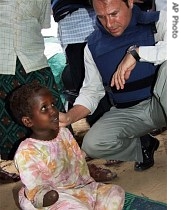2007年VOA标准英语-UNHCR Says Thousands Fleeing Somali Capital(在线收听)
Geneva
03 August 2007
The U.N. refugee agency reports between February and May, more than 400,000 civilians fled the Somali capital Mogadishu. This was sparked by heavy fighting between the Ethiopian-backed Transitional Federal Government and insurgents. The UNHCR says another 27,000 people have fled renewed violence since June. Lisa Schlein reports for VOA from UNHCR headquarters in Geneva.
U.N. refugee spokesman, Ron Redmond, says people who have fled the capital describe life in Mogadishu as unbearable. They say the level of daily violence made it too dangerous to remain.
"They say the insecurity is widespread, with constant bombing and gun battles," he said. "Mothers are unable to buy food for their children and workers unable to make a living. They also complain that their children cannot attend school and many neighborhoods are isolated because of insecurity or road closures. Young men told UNHCR that they left the capital for fear of being arrested, claiming that after outbreaks of violence, government forces sealed off the affected neighborhood and arrested any young men on the streets."
 |
| UN Humanitarian Coordinator for Somalia Erick Laroche chats with handicapped girl in an internally displaced camp situated on the outskirts of Mogadishu, 1 Aug. 2007 |
While the exodus from Mogadishu continues, the UNHCR reports about 125,000 people who had fled the capital earlier in the year have gone back. Despite the unstable situation, Redmond says many people have returned to Mogadishu because of the dire conditions they faced outside the city.
"When they fled, you may recall we had stories, for example, of people being charged to sit in the shade of a tree in some of the surrounding communities," he said. "The surrounding communities were absolutely swamped with people fleeing the city. I remember one town where they were charging for shade, I think they had something like 40,000 people there. So, in a situation like that, it is the lesser probably of two bad choices, so people go back home."
Redmond points to the town of Galkayo to show how this could happen. He says people told UNHCR harrowing tales of their flight along the dangerous road from Mogadishu to Galkayo. Many reported robberies and some women spoke of being raped by armed militiamen and thugs.
He says Galkayo is overcrowded and lacks water, sanitation, education and health services. He says most of the displaced say they want to go back to Mogadishu as soon as possible.